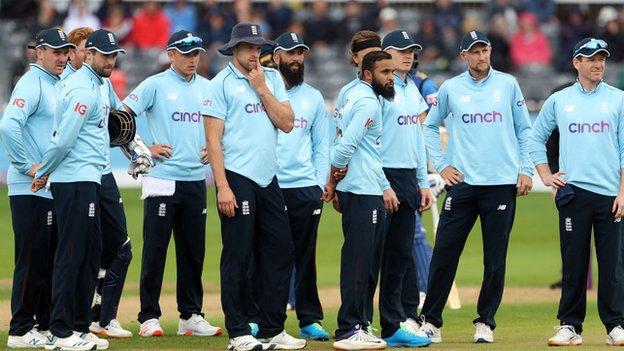

England are working on a “knife edge” after their one-day squad was hit by a coronavirus outbreak, says director of cricket Ashley Giles.
Positive tests returned by three players and four backroom staff have forced the entire squad into isolation.
A new team and staff has been named for the three-match series against Pakistan, which begins on Thursday.
“It’s been a mad 24 hours,” said Giles. “We got the news we feared last night of a bigger spread.”
England’s third one-day international against Sri Lanka in Bristol on Sunday was abandoned because of bad weather.
The original squad was due to then play Pakistan in Cardiff and when Giles spoke at lunchtime on Tuesday, they were still at the team hotel before travelling home.
Everyone associated with the squad has received at least one dose of a coronavirus vaccine.
“The aim is to get them home as quickly as possible,” said Giles. “Each case needs to be treated individually and risk assessed.”
The three-match ODI series against Pakistan is relatively low-key. The new squad includes nine uncapped players and will be led by Ben Stokes, who is working back to fitness after a broken finger.
In contrast, the three T20s that follow are important in England’s build-up for the World Cup in October. With that series beginning on 16 July, the chances of any member of the original squad taking part seems slim.
England were able to complete their entire 2020 home schedule by living, playing and training in bio-secure conditions in Manchester and Southampton.
During that time, there were no positive tests among the hosts or touring sides West Indies, Pakistan, Ireland and Australia.
However, England encountered problems during their winter tours. A one-day series in South Africa was postponed in December after a number of positive tests, while all-rounder Moeen Ali tested positive at the beginning of the tour of Sri Lanka in January.
Mindful of the toll the bio-secure conditions can take, the restrictions imposed this summer are not as stringent as last year, with Giles saying it is a balancing act between guarding against coronavirus and allowing the players some freedom.
They are allowed to mingle with each other in their hotels and can travel to play golf with the right risk assessment, but little else.
“We’re not gambling. We’re fully aware of the risks,” said Giles.

“That’s the knife edge we’re working on all the time. Looking after our people, looking after the revenues, too.”
Giles also said he was “confident” that no one associated with the squad had breached any protocols.
Beyond the Pakistan series, the England and Wales Cricket Board will be mindful of similar disruptions hitting the high-profile five-Test series against India, which begins on 4 August, or the inaugural season of The Hundred, starting on 21 July.
Many restrictions imposed on the public in England are being scrapped on 19 July.
“We’re living at a different rate to society,” said former England spinner Giles. “It’s particularly difficult when we know one case can shut you down, let alone seven.
“We’re juggling with the amount of time players have spent within these environments. To expect them to adhere to the sense that they go to the ground, stay away from each other, mask on, go to their room. If relaxing is allowing those guys to eat together, spend time together, it’s almost impossible to remove that risk.”
Further ahead, England are set for an Ashes tour of Australia this winter.
Australia has adhered to some of the strictest Covid restrictions in the world, with all visitors facing a 14-day quarantine period on arrival into the country.
The greater Sydney area is currently in a two-week lockdown, while on Tuesday the Formula 1 Grand Prix in Melbourne in November and the Moto GP race on Phillip Island in October were both called off.
The first Ashes Test in Brisbane is due to begin on 8 December.
“It’s on,” said Giles. “There’s obviously a lot to talk about. Every 24 hours, there are a lot of challenges.
“We’ll do everything possible. We’re all aware of the mental pressures this causes all of our people and we’ve got to try and work our way through that.” – bbc.com